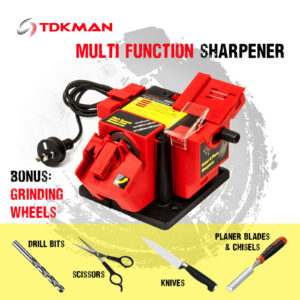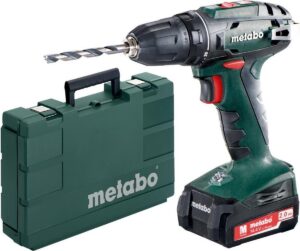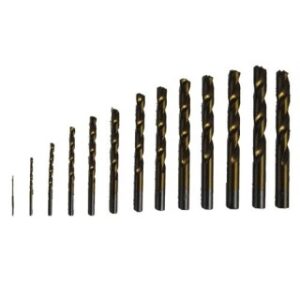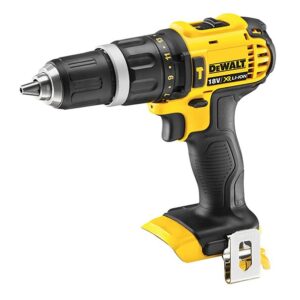3.1 Power tools
There are many types of power tools. All brands also have their own types and colors. The photos in this chapter are therefore an example. It can prevent machine needs to work.
Follow the following 8 agreements every time you start working with power tools.
| Rules | Why? |
| 1. First remove the plug from the socket when you need to change a drill, saw or milling cutter. | You concentrate on changing the drill bit, saw or milling cutter. You can accidentally press the power button. This is dangerous, because you can injure your hands and fingers. |
| 2. When you need to set up the machine, unplug it first. | You concentrate on setting up the machine. You can accidentally press the power button. This is dangerous, because you can injure your hands and fingers. |
| 3. Check the cord. Will not work with a machine with a broken cord or plug. | You can get a power surge and a short circuit can occur. |
| 4. Clamp the workpiece securely to the workbench. For example with a glue clamp. | Usually you need both hands to hold and operate the machine. |
| 5. Make sure you do not drill or saw in the workbench. | The workbench should last longer. |
| 6. Always carry the machine cord over your shoulder while working. | This way it doesn’t get in the way and you can’t accidentally saw through it. |
| 7. Do not make rough movements when working with machines. Also, do not use more force than necessary. Do the work slowly and gradually. | It is safer and you get a better result when you work quietly. |
| 8. Always wear hearing protection. | Working with machines is bad for your ears. Protect your ears so you won’t be deaf in 10 years. |
Questions
Are all drills the same?
Circle the correct answer.
- Yes.
- No.
Why do you have to unplug when you need to set up the machine?
………………………………………………….……………………………
……………………………………………. ………………………………….
Where do you put the cord of the machine while working?
…………………………………………….………………………………….
………………………………………….…………………………………….
3.2 The chisel sharpening machine
What can you do with a chisel sharpening machine?
Chisels become blunt if you use them a lot. You can then sharpen them on a chisel grinder.
What does a chisel sharpening machine look like?

How do you use a chisel sharpener?
- Set the leaning tool that the chisel rests on to the same skew as the crease of the chisel.
- Check that the grinding stone is clean and can rotate freely.
- Check your own safety. Don’t have loose clothes, cords, jewelery or hair that can get into the machine.
- Start the machine.
- Place the chisel on the leaning tool.
- Gently push the chisel against the sharpening stone. Sparks are generated during sharpening. In principle, these are not dangerous.
- Gently move the chisel back and forth along the sharpening stone.
- Cool the chisel in water regularly. This way you ensure that there are no blue burn marks on the chisel.
Sharpening on a chisel sharpening machine creates a burr at the crease of the chisel. After sharpening, you must therefore ‘sharpen’ the chisel with a whetstone.
- Moisten the whetstone.
- Wet the back of the chisel with a twisting motion first.
- After that, turn the chisel over and also sharpen the crease of the chisel.
- Repeat this several times.
Sharpening and honing a chisel is a skill that you have to practice a few times to get the hang of it.
Questions
Are the sparks created during sharpening dangerous?
Circle the correct answer.
- Yes.
- No.
Should the whetstone be wet or dry during sharpening?
Circle the correct answer.
- Wet.
- Dry.
3.3 The drilling machine
What can you do with a drill?
You drill holes with the drill. You can drill holes in walls and ceilings with large drills. You can drill holes in wood with smaller drills.
What does a drilling machine look like?

How do you use a drill?
You have to make sure that the right drill bit is in the machine. Because a drill bit to drill a hole in the wall is different from a drill bit to drill into wood.

How do you drill a hole?
You can poke a small hole in the wood with an awl. That’s where you put the tip of the drill. Keep the drill straight. Don’t press too hard yet. Turn on the machine. Then drill the hole. Do not do this too roughly or too hard, otherwise the drill will break.
If you need to drill a deep hole, back off the drill a few times as you drill. This will allow the sawdust to drain out of the hole. This retrieval of the drill is called ‘unloading’.
Questions
What does a drill bit look like with which you can drill holes in wood?
…………………………………………….…………………………………
……………………………………….. …………………………………….
What does “unload the drill” mean?
…………………………………………….………………………………..
………………………………………………………………………………

- Draw the line you want to cut out on the wood.
- Place the tip of the base plate on the wood.
- Make sure you keep the saw exactly behind the line (the saw must not touch the wood).
- Then turn on the machine.
- You can press the detent button during sawing. You block the on/off button that you don’t have to hold down. This works better for you.
- Slowly move the machine forward.
- Blow the sawdust away each time to keep seeing the line.
If your saw bounces and it is difficult to keep cutting along the line. So take it easy!
Turn off the machine before pulling it out of the wood (or pulling it back).
Questions
What happens if you push the saw too hard?
…………………………………………….………………………………..
…………………………………………… ………………………………..
Do you have to press the base plate onto the wood? Or do you have to pull it off?
…………………………………………….…………………………………..
……………………………………………………………………
Where do you put the cord while sawing?
…………………………………………….………………………………….
…………………………………………. …………………………………….









